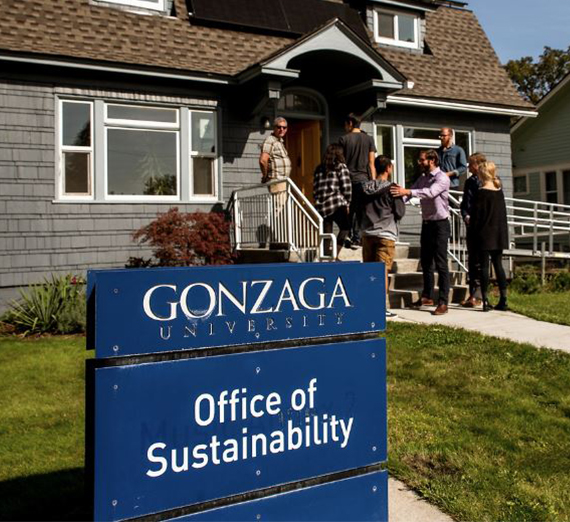Aspiration to Action: Sustainability and Climate Action Plan Seeking Input

You can get a lot done in a decade, just ask the Office of Sustainability.
Last year, Gonzaga’s first Climate Action Plan officially turned 10 years old and the four goals and 28 strategies that made it up are more than 80% complete.
That means it’s time to reevaluate.
In 2015, Pope Francis published an encyclical letter called Laudato Si’. In it, he stresses the prominence of environmental degradation and global warming and calls us to take “swift and unified global action.” Jim Simon, director of sustainability, is basing the new Climate Action Plan on the seven pillars of the Laudato Si’ Action Plan, the invitation he made to all Catholic works to implement the principals of his encyclical letter:
- Response to the cry of the earth
- Response to the cry of the poor
- Ecological economics
- Adoption of sustainable lifestyles
- Ecological education
- Ecological spirituality
- Community resilience and empowerment
Simon says the new plan will focus on moving from aspiration to action, and these seven goals provide the context needed for the University to do so. Since the spring, a group of roughly 20 people have been meeting to put this into action – looking at what other schools do, what’s been done in the past, identifying strengths and roadblocks and proposing a whole new set of ideas.
For example, looking at the Laudato Si’ pillar “adoption of sustainable lifestyles” inspired ideas like opening a daycare on campus to reduce emissions or enhancing move-in and move-out programming to lessen waste.
They’re also planning on a smaller timeline. Instead of 10 years, the team envisions three to five more years of concerted efforts before reevaluating again.
Why? Simon says it best, “If we say we’re going to do something in 10 days, we procrastinate and do all the work on day nine. We’ll get it done, but we’re probably not proactively working the entire 10 days.”
Checking in sooner rather than later will help keep the University on track and allow for better adaptation to our rapidly changing world.
Simon spent the last few months laying the groundwork, and now he wants more voices in the mix. The Office of Sustainability is asking for faculty, staff and students to join their working group and help turn strategy into action.
Group members will dedicate three to four hours of work each month and pitch in at the occasional event. “It’s a small commitment for a big impact,” Simon adds.
He hopes to roll out the updated plan in the spring, but to do it right and involve the community extensively, Simon knows it may take more time.
“We’re approaching this with hope and optimism and trying not to look at the road ahead with a sense of concern or worry.”
